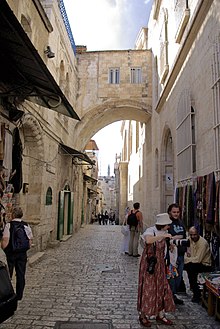| Revision as of 15:40, 21 December 2011 editAll Rows4 (talk | contribs)589 edits →Bibliography: de-POV, per previous edit← Previous edit | Revision as of 19:37, 21 December 2011 edit undoNableezy (talk | contribs)Extended confirmed users, Page movers, Pending changes reviewers, Rollbackers56,194 edits Undid revision 467036924 by All Rows4 (talk) no, because this actually is in the palestinian territoriesNext edit → | ||
| Line 29: | Line 29: | ||
| ] | ] | ||
| {{Palestine-stub}} | |||
| {{Church-stub}} | {{Church-stub}} | ||
Revision as of 19:37, 21 December 2011
This article is about the church. For other uses, please see Ecce Homo (disambiguation).
Ecce Homo Church is a Roman Catholic church on Via Dolorosa in Jerusalem, along the path that according to tradition Jesus walked, carrying his cross, on the way to his crucifixion. The church is now part of the Convent of the Sisters of Zion.
The Latin words Ecce Homo (i.e. Behold the Man) are attributed to Pontius Pilate in the Gospel of John 19:5, when he presented a scourged Jesus Christ, bound and crowned with thorns, to a hostile crowd.
The church contains one arch of a Roman gateway, which has a further arch crossing the Via Dolorosa outside. There was originally a third arch to the gateway, on the other side of the street; in the sixteenth century, it was incorporated into a monastery for Uzbek dervishes in the Order of the Golden Chain, but this was later demolished, taking the arch with it.
Traditionally, the arch was said to have been part of the gate of Herod's Antonia Fortress, which itself was alleged to be the location of Jesus' trial by Pontius Pilate; the traditional conclusion was that the arch was the location of Pontius Pilate's Ecce Homo speech, reported by the Bible. However, due to archaeological investigation, it is now known that the arch is a triple-arched gateway, built by Hadrian, as an entrance to the eastern Forum of Aelia Capitolina; the site of the forum was previously a large open-air pool of water (the Strouthion Pool).
See also
References
- John 19.5
- Pierre Benoit, The Antonia of Herod the Great, and the East Forum of Aelia Capitolina (1971)
Bibliography
31°46′49″N 35°14′00″E / 31.780332°N 35.233267°E / 31.780332; 35.233267
This article about the region of Palestine is a stub. You can help Misplaced Pages by expanding it. |
This article about a church building or other Christian place of worship is a stub. You can help Misplaced Pages by expanding it. |